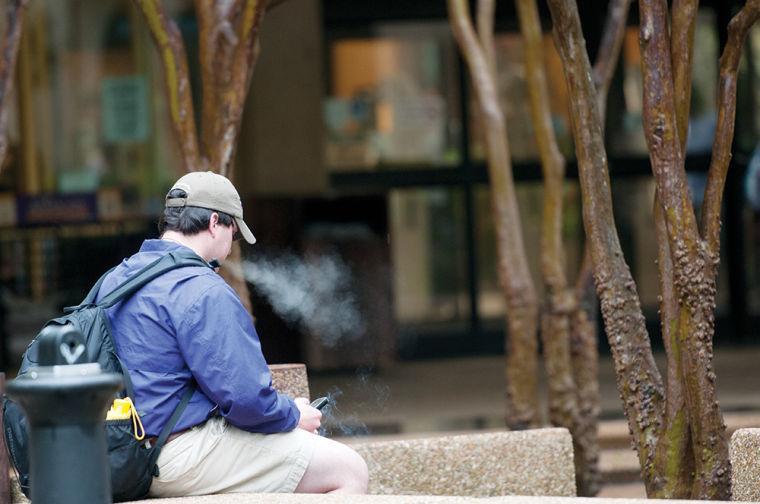Peppering the Quad and other areas around campus, cigarette butts are a common sight, but some students are working to change that.
The University chapter of Fresh Campus, a new official student organization, will be at the Wellness Fair in the Student Union today to raise awareness about health risks associated with smoking and to gather student support for the organization.
This year’s Wellness Fair coincides with Kick Butts Day, which, according to the Kick Butts Day website, is “a national day of activism that empowers youth to stand out, speak up and seize control against Big Tobacco.”
Fresh Campus is partnered with Smoking Words, which is a tobacco education program on campus that advocates for a smoke-free campus, said Judith Sylvester, mass communication associate professor and adviser for the University chapter of Fresh Campus.
Around 70 percent of students on campus don’t smoke and 30 percent do, which is a combination of social smokers and addicted smokers, Sylvester said. The organizations aim to educate students on smoking risks, she said.
The tax plan recently put forth by Gov. Bobby Jindal’s administration would potentially raise taxes on tobacco products to $1.41 per pack, and Sylvester said that may cause the percentage of student smokers to drop further.
Fresh Campus will provide boiled crawfish to students at the Wellness Fair, but in order to get crawfish, students must visit the Fresh Campus booth to receive a ticket, Sylvester said.
“The Rec Center is going to have a dance from 5 to 6:30 p.m. on the tennis courts in support of Kick Butts Day as well,” she said.
Mass communication sophomore and vice president of the University chapter of Fresh Campus Bene’ Vincent said the booth will have games for students to play, and items will be given away in addition to pamphlets advocating for a smoke-free campus.
Vincent became involved with the initiative to create a smoke-free campus because of a smoking-related death in her family.
“I was really intrigued because my grandma actually died from smoking, so I wanted to input as much as I could in getting the organization formed,” she said.
Growing Fresh Campus is a goal of Vincent’s, and she said students need to step up to address the risks smoking has on students.
“We need people to start coming up and saying how this is affecting them so that the administrators do know this isn’t just a minority [or] smaller amount of students who are affected – it’s a lot. They just don’t come out and say anything,” she said.
Finance sophomore Chris Bryant said although he isn’t a smoker, smoking on campus isn’t an issue for him.
“It’s not like [they’re smoking] inside,” he said.
Jourdan Ooi, computer science sophomore, sat adjacent to Bryant near the entrance of the library, where students often gather for smoke breaks. Ooi said he didn’t have a problem with smokers on campus and it doesn’t bother him, either.
“That guy is smoking; she is smoking,” Ooi said as he pointed to several smokers around the vicinity, noting that smoke was nowhere near him.
Though smoking on campus may not be noticeable to some students, others find secondhand smoke bothersome.
Math freshman Gabrean Stansbury said she doesn’t like breathing in secondhand smoke on campus.
“I feel like everywhere I go there is someone smoking,” she said.
Stansbury said a smoke-free campus would benefit the campus as a whole.
“I think [a smoke-free campus] is a good idea, but I don’t think it’ll work because too many people smoke,” said math junior Meredith Caldwell.
Caldwell questioned the University’s ability to enforce a campus-wide ban on smoking.
Sylvester is optimistic about establishing the University as a smoke-free campus, and said the event today will help raise awareness about the topic and gain additional student support for Fresh Campus.
“I think the problem is everybody thinks [a smoke-free campus] has to be 100 percent, immediately,” she said. “No, we want to change the campus culture. You can’t do that overnight, you can’t just dictate it and have it happen.”
Louisiana has been ahead of the curve with initiatives to stop smoking in certain areas, Sylvester said, and that is important to her.
“It’s really a concern for the campus first and foremost,” she said. “But it’s really a concern for the whole state, and I think LSU certainly has a responsibility to try to prevent as much tobacco use as possible, just for the good of our own state.”
“It’s really a concern for the campus first and foremost. But it’s really a concern for the whole state and I think LSU certainly has a responsibility to try to prevent as much tobacco use as possible, just for the good of our own state.”





